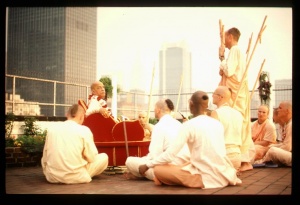SB 10.38.39: Difference between revisions
m (1 revision(s)) |
(Vanibot #0018 edit: make synonym terms in Sanskrit italic in SB - Vanisource) |
||
| Line 1: | Line 1: | ||
{{info | {{info | ||
|speaker= | |speaker=Śukadeva Gosvāmī | ||
|listener=King | |listener=King Parīkṣit | ||
}} | }} | ||
[[Category:Srimad-Bhagavatam - Canto 10 Chapter 38]] | |||
[[Category:Bhagavatam Verses Spoken by Sukadeva Gosvami - Vanisource|103839]] | |||
<div style="float:left">'''[[Srimad-Bhagavatam]] - [[SB 10|Tenth Canto]] - [[SB 10.38: Akrura's Arrival in Vrndavana|Chapter 38: Akrūra's Arrival in Vṛndāvana]]'''</div> | |||
<div style="float:right">[[File:Go-previous.png|link=SB 10.38.37-38]] '''[[SB 10.38.37-38]] - [[SB 10.38.40]]''' [[File:Go-next.png|link=SB 10.38.40]]</div> | |||
{{RandomImage}} | |||
{{SBnotice}} | |||
==== TEXT 39 ==== | ==== TEXT 39 ==== | ||
<div | <div class="verse"> | ||
nivedya gāṁ cātithaye | :nivedya gāṁ cātithaye | ||
saṁvāhya śrāntam āḍṛtaḥ | :saṁvāhya śrāntam āḍṛtaḥ | ||
annaṁ bahu-guṇaṁ medhyaṁ | :annaṁ bahu-guṇaṁ medhyaṁ | ||
śraddhayopāharad vibhuḥ | :śraddhayopāharad vibhuḥ | ||
</div> | </div> | ||
| Line 17: | Line 22: | ||
==== SYNONYMS ==== | ==== SYNONYMS ==== | ||
<div | <div class="synonyms"> | ||
''nivedya''—presenting in charity; ''gām''—a cow; ''ca''—and; ''atithaye''—to the guest; ''saṁvāhya''—massaging; ''śrāntam''—who was tired; ''adṛtaḥ''—with great respect; ''annam''—cooked food; ''bahu-guṇam''—of various tastes; ''medhyam''—suitable for offering; ''śraddhayā''—faithfully; ''upāharat''—offered; ''vibhuḥ''—the almighty Lord. | |||
</div> | </div> | ||
{{SBcollapse}} | |||
==== TRANSLATION ==== | ==== TRANSLATION ==== | ||
<div | <div class="translation"> | ||
The almighty Lord Balarāma presented Akrūra with the gift of a cow, massaged his feet to relieve him of fatigue and then with great respect and faith fed him suitably prepared food of various fine tastes. | The almighty Lord Balarāma presented Akrūra with the gift of a cow, massaged his feet to relieve him of fatigue and then with great respect and faith fed him suitably prepared food of various fine tastes. | ||
</div> | </div> | ||
| Line 31: | Line 36: | ||
==== PURPORT ==== | ==== PURPORT ==== | ||
<div | <div class="purport"> | ||
According to Śrīla Viśvanātha Cakravartī, Akrūra went to Kṛṣṇa's and Balarāma's house on the twelfth lunar day, on which one should not break a fast at night. However, Akrūra dispensed with this formality because he was eager to receive food in the Lord's house. | According to Śrīla Viśvanātha Cakravartī, Akrūra went to Kṛṣṇa's and Balarāma's house on the twelfth lunar day, on which one should not break a fast at night. However, Akrūra dispensed with this formality because he was eager to receive food in the Lord's house. | ||
</div> | </div> | ||
__NOTOC__ | </div> | ||
</div> | |||
<div style="float:right">[[File:Go-previous.png|link=SB 10.38.37-38]] '''[[SB 10.38.37-38]] - [[SB 10.38.40]]''' [[File:Go-next.png|link=SB 10.38.40]]</div> | |||
__NOTOC__ | |||
__NOEDITSECTION__ | |||
Revision as of 14:44, 1 December 2017

A.C. Bhaktivedanta Swami Prabhupada
Please note: The synonyms, translation and purport of this verse were composed by disciples of Śrīla Prabhupāda
TEXT 39
- nivedya gāṁ cātithaye
- saṁvāhya śrāntam āḍṛtaḥ
- annaṁ bahu-guṇaṁ medhyaṁ
- śraddhayopāharad vibhuḥ
SYNONYMS
nivedya—presenting in charity; gām—a cow; ca—and; atithaye—to the guest; saṁvāhya—massaging; śrāntam—who was tired; adṛtaḥ—with great respect; annam—cooked food; bahu-guṇam—of various tastes; medhyam—suitable for offering; śraddhayā—faithfully; upāharat—offered; vibhuḥ—the almighty Lord.
Translation and purport composed by disciples of Śrīla Prabhupāda
TRANSLATION
The almighty Lord Balarāma presented Akrūra with the gift of a cow, massaged his feet to relieve him of fatigue and then with great respect and faith fed him suitably prepared food of various fine tastes.
PURPORT
According to Śrīla Viśvanātha Cakravartī, Akrūra went to Kṛṣṇa's and Balarāma's house on the twelfth lunar day, on which one should not break a fast at night. However, Akrūra dispensed with this formality because he was eager to receive food in the Lord's house.